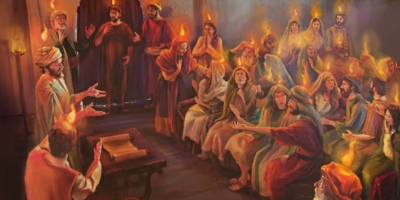Drawing Principles from ‘Acts’ for Twenty-First Century Use -Bidur Adhikari

May 23-
Let’s theologise some.
After all, we all are theologians in a way- we have certain way of expounding the Scriptures, and a certain way of thinking about God.
Who claim they don’t have or espouse any theology, but simply let the Scripture speak for itself are either too naive about what they are claiming, or are plain dishonest.
“Acts—The Problem of Historical Precedent” – the article can be downloaded here: https://adhikpost.com/wp-content/uploads/2021/05/Acts-Reader-a-Fee-Stuart-1.pdf
This is one of the summaries of articles/content I wrote during BILD classes kin 2014-16:
Drawing Principles from Acts for Twenty-First Century Use
Thesis:
The Book of Acts has been a ground for divisions and contentions among various denominations and groups, chiefly because they confuse the principles found there with the practices of the then church, thereby insisting that what was normal at that time should be normative for us now also.
Description of Core Concepts: Acts is both historical and theological book: it records what happened, but instead of recording everything/detail, just records the important (from the Author’s/the author’s viewpoint) incidents so as to provide teachings and standards for the readers/ later generations. And since, Church, as we know it today (of Jewish and gentile) was birthed in Acts, it is a transitional period between the OT and the NT. So many events and divine interventions were necessary to clarify to the Jewish disciples that God has accepted the gentiles too through the gospel.
Speaking in unknown (to the speaker!) tongues; tongues like fire; shaking of the house while praying- are these mandatory for today too?

In general, doctrinal statements derived from Scripture fall into three or four categories: (1) Christian theology (what Christians believe), (2) Christian ethics (how Christians ought to behave), (3) Christian experience and Christian practice (what Christians do). Within these categories one might further distinguish two levels of statements, which can be called primary and secondary. Primary level statements are those doctrinal statements derived from the explicit propositions or imperatives of Scripture (i.e., what Scripture intends to teach). At the secondary level are those statements derived only incidentally, by implication or by precedent.
Record of Significant Quotes: We grant that exegesis of this kind that pursues the what and why of Luke’s narrative is not necessarily devotionally exciting, but we would argue that it is the mandatory first step to the proper hearing of Acts as Gods Word. Not every sentence in every narrative or speech is necessarily trying to tell us something. But every sentence in every narrative or speech contributes to what God is trying to say as a whole through Acts.
Our assumption, shared by many others, is that unless Scripture explicitly tells us we must do something, what is only narrated or described does not function in a normative way–unless it can be demonstrated on other grounds that the author intended it to function in this way. There are good reasons for making this assumption.
In matters of Christian experience, and even more so of Christian practice, biblical precedents may sometimes be regarded as repeatable patterns–even if they are not understood to be normative. That is, for many practices there seems to be full justification for the later churches repeating of biblical patterns; but it is moot to argue that all Christians in every place and every time must repeat the pattern or they are disobedient to God’s Word. This is especially true when the practice itself is mandatory but the mode is not. 
Present day relevance: The issue of burial and/or cremation
All biblical characters of faith and good standing with God are given burial. Only the outcast, evil, and unfaithful are cremated. And those who dies unnatural death, killed in wars etc. were also cremated. That is the precedent. But is this normative for us today? Does this affect one’s salvation? Certainly not. So one need not make hills of mole today if Christians are not given a burial. Specially, during such pandemic as the COVID-19 crises, burial is practically unwise and difficult as well.
Conclusion: Not all records in the Scripture are prescriptions- most of the are mere descriptions. One cannot demand certain events or occurrence be repeated, for they were one of its kind. But we can glean principles and insights from them. Therefore, let us not raise a hue and cry over cremation over burial!
पुरानोको करार, र वा प्रेरितको पुस्तकमा उल्लेख गरिएका सबै कुरा अहिलेको लागि त्यहीअनुसार गर्नुपछ भन्ने होइन । कतिपय कुरा बाध्यकारी, शिक्षाका रूपमा छन् भने कतिपयचाहिँ यस्तो भयो, भएको थियो भन्ने इतिहास अभिलेख मात्रै हुन्, तिनबाट परोक्ष शिक्षामात्रै निकाल्न मिल्छ , जस्तै माथिल्लो तलामा प्रार्थना गर्दा पवित्र आत्मा आउनुभयो, घर हल्लियो । (अहिले आत्मा त्यसरी आगोका जिब्राझैं आउनुहुन्न, घर पनि हल्लिँदैन) ।
Authors/Reporter: Gordon Fee and Douglas Stuart Book: How to Read the Bible for All Its Worth
Date/Volume/Issue: 1993, Sixth edition Publisher: Zondervan Publishing House
Title: “Acts—The Problem of Historical Precedent” Pages: Chapter 8, pp. 118-132

